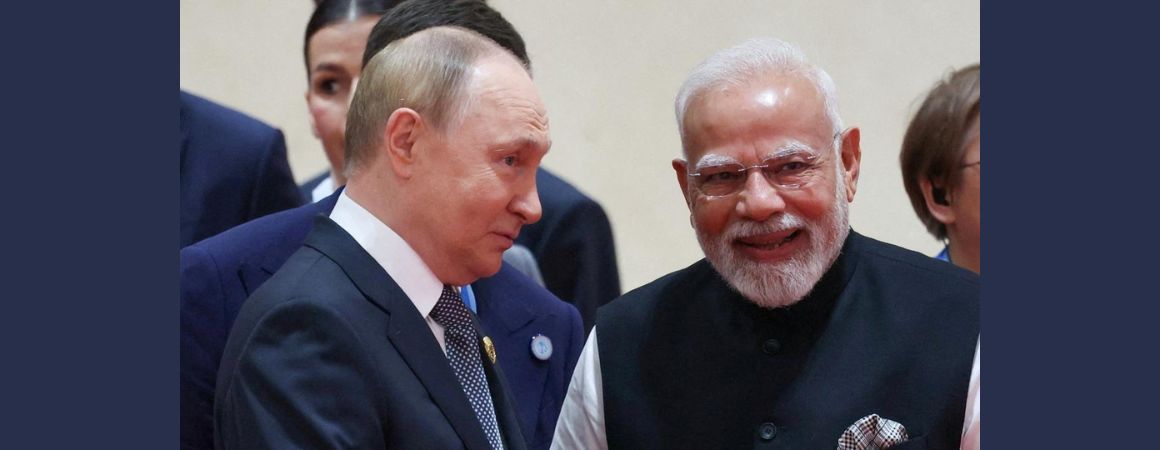According to latest data, India cut Russian oil imports by 16% in September; future orders unclear
Russian President Vladimir Putin is expected to travel to India to hold the 23rd annual India-Russia summit with Prime Minister Narendra Modi on December 5, sources confirmed on Thursday. The visit, Mr. Putin’s first trip to India since 2021 and the Russian invasion of Ukraine in February 2022, will come even as New Delhi weighs its options on the import of Russian oil given U.S. penalty tariffs and EU sanctions. According to the latest data, India’s imports of Russian oil in September saw a 16% decline from September 2024, a possible indicator that after three years of increasing its intake of discounted Russian oil multi-fold, the Modi government could be diversifying to other oil sources after facing 25% U.S. penalty tariffs on the issue.
Ahead of Mr. Putin’s visit, Russian Deputy Prime Minister Dmitry Patrushev visited Delhi last week, when he met Mr. Modi and discussed economic issues, including a Free Trade Agreement under negotiation and agricultural trade. The comprehensive agenda is likely to be firmed up during another ministerial visit, possibly by Russian Foreign Minister Sergey Lavrov, before the Summit. Mr. Modi and Mr. Putin have also spoken directly, including once in person in Tianjin on the sidelines of the SCO Summit on September 1, and twice over the telephone, on August 8 and September 17, when Mr. Modi said he looked forward to receiving Mr. Putin in Delhi “later this year”.
The two sides are expected to discuss a number of agreements, including strategic and connectivity issues, balancing trade, the Ukraine war and Indian defence purchases from Russia. However, questions are being raised over whether New Delhi will give in to U.S. demands to cut or reduce Russian oil imports before then, and whether the issue has already been discussed with Moscow.
According to Bloomberg agency reports on Thursday that cited data from real time maritime analytics provider Kpler, India’s oil imports from Russia, that make up a third of its total intake, dipped in September. The Kpler data indicated that oil cargoes reaching New Delhi from Moscow in September totalled 1.61 million barrels a day in September, a 16% decline on a year-over-year basis. It remains to be seen whether this is a trend that would continue in the next few months, as orders are placed weeks in advance.
While the Modi government has consistently stated it would make its decision on Russian oil according to Indian market interests and energy security, it had similarly cut down its intake of oil from Iran and Venezuela in 2018 before ending all imports over U.S. threats of sanctions, while stepping up U.S. oil imports. According to experts, an increase in oil production by OPEC plus countries this week could also ease prices from other sources.
Accusing the U.S. of putting pressure on India to cut Russian oil as a way of “eliminating competition,” Mr. Lavrov had said the conversation over India-Russia oil trade was strictly bilateral between the two countries.
“The way in which and with whom to trade including with Russia this belongs to Russian Indian relations,” Mr. Lavrov said at the Valdai forum on Wednesday, according to a translated version of his remarks. “This position has been set out both by Prime Minister Modi and by Foreign Minister Jaishankar and I believe this position reflects the national interest and national dignity of our Indian friends,” he added.
The annual summit between Indian and Russian leaders has been the tradition decided between the two countries when they signed a Strategic Partnership on October 3, 2000, and its 25th anniversary falls on Friday.
“On this day 25 years ago the Russia-India Declaration on Strategic Partnership was signed. This milestone marked an important stage in the development of Russia-India relations, based on mutual respect and consideration of each other’s interests,” posted Russian MFA spokesperson Maria Zakharova marking the day.
Putin to visit India, meet Modi on December 5
According to latest data, India cut Russian oil imports by 16% in September; future orders unclear
Russian President Vladimir Putin is expected to travel to India to hold the 23rd annual India-Russia summit with Prime Minister Narendra Modi on December 5, sources confirmed on Thursday. The visit, Mr. Putin’s first trip to India since 2021 and the Russian invasion of Ukraine in February 2022, will come even as New Delhi weighs its options on the import of Russian oil given U.S. penalty tariffs and EU sanctions. According to the latest data, India’s imports of Russian oil in September saw a 16% decline from September 2024, a possible indicator that after three years of increasing its intake of discounted Russian oil multi-fold, the Modi government could be diversifying to other oil sources after facing 25% U.S. penalty tariffs on the issue.
Ahead of Mr. Putin’s visit, Russian Deputy Prime Minister Dmitry Patrushev visited Delhi last week, when he met Mr. Modi and discussed economic issues, including a Free Trade Agreement under negotiation and agricultural trade. The comprehensive agenda is likely to be firmed up during another ministerial visit, possibly by Russian Foreign Minister Sergey Lavrov, before the Summit. Mr. Modi and Mr. Putin have also spoken directly, including once in person in Tianjin on the sidelines of the SCO Summit on September 1, and twice over the telephone, on August 8 and September 17, when Mr. Modi said he looked forward to receiving Mr. Putin in Delhi “later this year”.
The two sides are expected to discuss a number of agreements, including strategic and connectivity issues, balancing trade, the Ukraine war and Indian defence purchases from Russia. However, questions are being raised over whether New Delhi will give in to U.S. demands to cut or reduce Russian oil imports before then, and whether the issue has already been discussed with Moscow.
According to Bloomberg agency reports on Thursday that cited data from real time maritime analytics provider Kpler, India’s oil imports from Russia, that make up a third of its total intake, dipped in September. The Kpler data indicated that oil cargoes reaching New Delhi from Moscow in September totalled 1.61 million barrels a day in September, a 16% decline on a year-over-year basis. It remains to be seen whether this is a trend that would continue in the next few months, as orders are placed weeks in advance.
While the Modi government has consistently stated it would make its decision on Russian oil according to Indian market interests and energy security, it had similarly cut down its intake of oil from Iran and Venezuela in 2018 before ending all imports over U.S. threats of sanctions, while stepping up U.S. oil imports. According to experts, an increase in oil production by OPEC plus countries this week could also ease prices from other sources.
Accusing the U.S. of putting pressure on India to cut Russian oil as a way of “eliminating competition,” Mr. Lavrov had said the conversation over India-Russia oil trade was strictly bilateral between the two countries.
“The way in which and with whom to trade including with Russia this belongs to Russian Indian relations,” Mr. Lavrov said at the Valdai forum on Wednesday, according to a translated version of his remarks. “This position has been set out both by Prime Minister Modi and by Foreign Minister Jaishankar and I believe this position reflects the national interest and national dignity of our Indian friends,” he added.
The annual summit between Indian and Russian leaders has been the tradition decided between the two countries when they signed a Strategic Partnership on October 3, 2000, and its 25th anniversary falls on Friday.
“On this day 25 years ago the Russia-India Declaration on Strategic Partnership was signed. This milestone marked an important stage in the development of Russia-India relations, based on mutual respect and consideration of each other’s interests,” posted Russian MFA spokesperson Maria Zakharova marking the day.






NO COMMENT